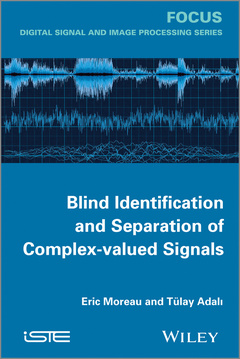Description
Blind Identification and Separation of Complex-valued Signals
Authors: Moreau Eric, Adali Tülay
Language: English
Subject for Blind Identification and Separation of Complex-valued...:
112 p. · 16.5x24.1 cm · Hardback
Description
/li>Contents
/li>Biography
/li>
The authors of this book consider the blind identification and source separation problem in the complex-domain, where the available statistical properties are richer and include non-circularity of the sources ? underlying components. They define identifiability conditions and present state-of-the-art algorithms that are based on algebraic methods as well as iterative algorithms based on maximum likelihood theory.
Contents
1. Mathematical Preliminaries.
2. Estimation by Joint Diagonalization.
3. Maximum Likelihood ICA.
About the Authors
Eric Moreau is Professor of Electrical Engineering at the University of Toulon, France. His research interests concern statistical signal processing, high order statistics and matrix/tensor decompositions with applications to data analysis, telecommunications and radar.
Tülay Adali is Professor of Electrical Engineering and Director of the Machine Learning for Signal Processing Laboratory at the University of Maryland, Baltimore County, USA. Her research interests concern statistical and adaptive signal processing, with an emphasis on nonlinear and complex-valued signal processing, and applications in biomedical data analysis and communications.
The authors consider the blind estimation of a multiple input/multiple output (MIMO) system that mixes a number of underlying signals of interest called sources. They also consider the case of direct estimation of the inverse system for the purpose of source separation. They then describe the estimation theory associated with the identifiability conditions and dedicated algebraic algorithms. The algorithms depend critically on (statistical and/or time frequency) properties of complex sources that will be precisely described.
Preface ix
Acknowledgments xi
Chapter 1. Mathematical Preliminaries 1
1.1. Introduction 1
1.2. Linear mixing model 1
1.3. Problem definition 3
1.4. Statistics 4
1.4.1. Statistics of random variables and random vectors 4
1.4.2. Differential entropy of complex random vectors 7
1.4.3. Statistics of random processes 7
1.4.4. Complex matrix decompositions 11
1.5. Optimization: Wirtinger calculus 13
1.5.1. Scalar case 14
1.5.2. Vector case 18
1.5.3. Matrix case 23
1.5.4. Summary 25
Chapter 2. Estimation By Joint Diagonalization 27
2.1. Introduction 27
2.2. Normalization, dimension reduction and whitening 27
2.2.1. Dimension reduction 28
2.2.2. Whitening 30
2.3. Exact joint diagonalization of two matrices 31
2.3.1. After the whitening stage 31
2.3.2. Without explicit whitening 33
2.4. Unitary approximate joint diagonalization 35
2.4.1. Considered problem 35
2.4.2. The 2 × 2 Hermitian case 38
2.4.3. The 2 × 2 complex symmetric case 40
2.5. General approximate joint diagonalization 42
2.5.1. Considered problem 42
2.5.2. A relative gradient algorithm 44
2.6. Summary 45
Chapter 3. Maximum Likelihood ICA 47
3.1. Introduction 47
3.2. Cost function choice 48
3.2.1. Mutual information and mutual information rate minimization 49
3.2.2. Maximum likelihood 52
3.2.3. Identifiability of the complex ICA model 53
3.3. Algorithms 57
3.3.1. ML ICA: unconstrained W 57
3.3.2. Complex maximization of non-Gaussianity: ML ICA with unitary W 63
3.3.3. Density matching 67
3.3.4. A flexible complex ICA algorithm: Entropy bound minimization 75
3.4. Summary 81
Bibliography 83
Index 93
Eric Moreau is Professor, University of Sud Toulon Var, France.
Ms. Tulay Adali is Professor at University of Maryland, Baltimore County, USA.
These books may interest you

Stochastic signal processing 49.25 €



